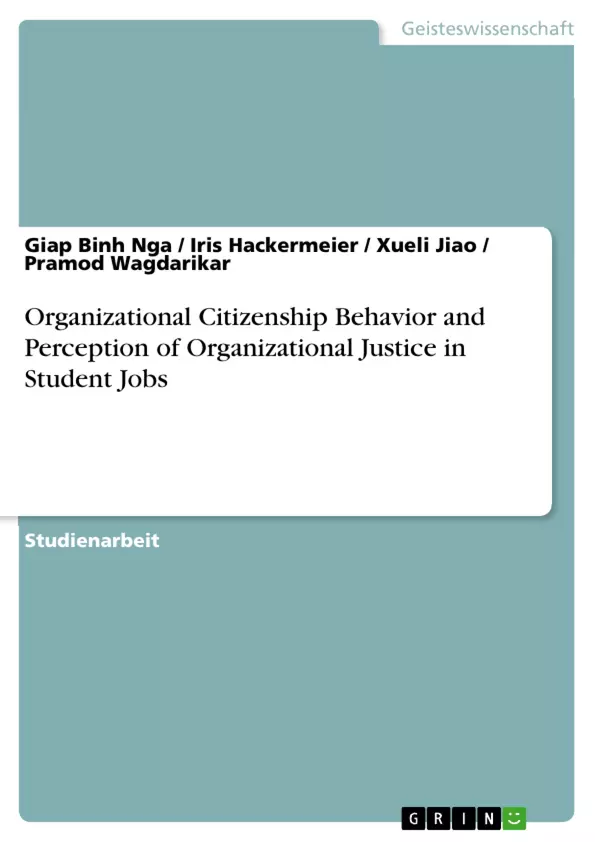This research shows some interesting suggestions for personnel work in a company or organization and broadens our view while doing job analysis.
Inhaltsverzeichnis
- Introduction
- Theoretical Background
- Determining factors in Workplace Behavior
- Organizational Citizenship Behavior (OCB)
- Organizational Justice (OJ)
- Related studies on relationship between OCB & Oj
- Method
- Hypotheses
- Results
- Discussion
- Conclusion
- References
Zielsetzung und Themenschwerpunkte
Die Forschungsarbeit untersucht das Verhalten von Studenten in Teilzeitjobs und die Auswirkungen von wahrgenommener organisationaler Gerechtigkeit auf ihr organisationales Bürgerverhalten (OCB). Die Studie zielt darauf ab, die Beziehung zwischen OCB und organisationaler Gerechtigkeit in diesem spezifischen Kontext zu analysieren.
- Organizational Citizenship Behavior (OCB) in Studentenjobs
- Wahrnehmung von organisationaler Gerechtigkeit in Studentenjobs
- Zusammenhang zwischen OCB und organisationaler Gerechtigkeit
- Faktoren, die OCB und die Wahrnehmung von organisationaler Gerechtigkeit beeinflussen
- Implikationen für die Praxis
Zusammenfassung der Kapitel
Die Einleitung führt in das Thema des organisationalen Bürgerverhaltens (OCB) in Studentenjobs ein und erläutert die Relevanz der Forschungsfrage. Sie beleuchtet die Besonderheiten von Studentenjobs und die Bedeutung von OCB in diesem Kontext.
Der theoretische Hintergrund beleuchtet die verschiedenen Faktoren, die das Verhalten am Arbeitsplatz beeinflussen, und stellt die Konzepte von OCB und organisationaler Gerechtigkeit vor. Er beschreibt die verschiedenen Dimensionen von OCB und organisationaler Gerechtigkeit und beleuchtet die Beziehung zwischen diesen beiden Konzepten.
Die Methodenbeschreibung erläutert die Vorgehensweise der Forschungsstudie, einschließlich der Stichprobengröße, der Datenerhebungsmethode und der verwendeten Messinstrumente.
Die Ergebnisse der Studie werden präsentiert und analysiert. Die Ergebnisse zeigen die Beziehung zwischen OCB und organisationaler Gerechtigkeit in Studentenjobs auf und beleuchten die Faktoren, die diese Beziehung beeinflussen.
Die Diskussion der Ergebnisse setzt die Ergebnisse in den Kontext der bestehenden Literatur und diskutiert die Implikationen der Ergebnisse für die Praxis.
Schlüsselwörter
Die Schlüsselwörter und Schwerpunktthemen des Textes umfassen organisationales Bürgerverhalten (OCB), Wahrnehmung von organisationaler Gerechtigkeit, Studentenjobs, Teilzeitbeschäftigung, Arbeitsverhalten, Arbeitsmotivation, Arbeitszufriedenheit, Fairness, Gerechtigkeitsempfinden, Arbeitsbedingungen, Arbeitsklima, Personalmanagement, Organisationsentwicklung.
Häufig gestellte Fragen
Was ist Organizational Citizenship Behavior (OCB)?
OCB bezeichnet freiwilliges Verhalten am Arbeitsplatz, das über die formale Jobbeschreibung hinausgeht und die Effektivität der Organisation fördert.
Wie beeinflusst organisationale Gerechtigkeit das Verhalten von Studenten?
Die Studie untersucht, wie die Wahrnehmung von Fairness und Gerechtigkeit in Studentenjobs dazu führt, dass Studenten mehr oder weniger freiwilliges Engagement (OCB) zeigen.
Welche Faktoren beeinflussen die Arbeitsmotivation in Studentenjobs?
Neben der Gerechtigkeit spielen Faktoren wie Arbeitsbedingungen, das Arbeitsklima und die individuelle Wahrnehmung von Fairness eine zentrale Rolle.
Gibt es einen direkten Zusammenhang zwischen OCB und Arbeitszufriedenheit?
Ja, die Forschung legt nahe, dass eine hohe Zufriedenheit und ein starkes Gerechtigkeitsempfinden das Ausmaß an OCB positiv beeinflussen.
Welche praktischen Implikationen hat die Studie für Unternehmen?
Unternehmen können durch eine gerechte Gestaltung von studentischen Arbeitsplätzen die Motivation und das freiwillige Engagement ihrer studentischen Hilfskräfte steigern.
- Quote paper
- Giap Binh Nga (Author), Iris Hackermeier (Author), Xueli Jiao (Author), Pramod Wagdarikar (Author), 2005, Organizational Citizenship Behavior and Perception of Organizational Justice in Student Jobs, Munich, GRIN Verlag, https://www.grin.com/document/152678



